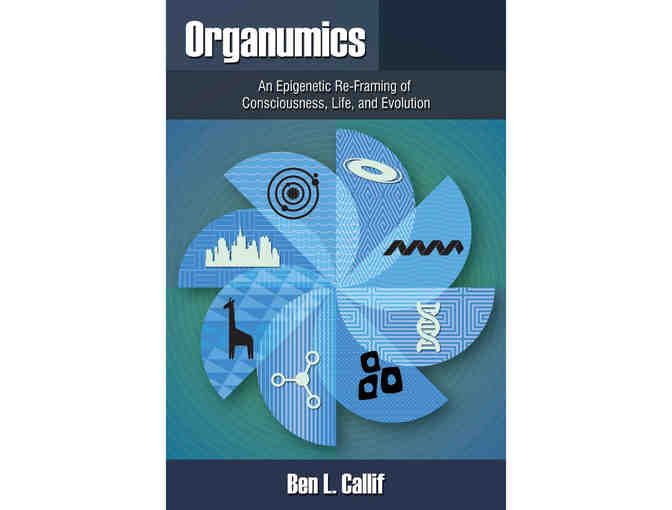Books
Organumics: An Epigenetic Re-Framing of Consciousness, Life, and Evolution
- Item Number
- 214
- Estimated Value
- 19 USD
- Opening Bid
- 8 USD
Item Description
Where does consciousness fit into biology? How did life evolve? What makes us human?
These are just a few of the deep and universal questions that the new science and philosophy of epigenetics may be able to answer.
Epigenetics (“above and beyond genetics”) is an exciting new field, but it remains relatively unknown, even as genetics has been saturating scientific news since the early 1990s. Whether it was through the Human Genome Project, the heritability of a disease, or DNA ancestry testing, most people have likely heard of genetics. But, despite its popularity, very few truly understand the scope of genetics or what in fact constitutes a gene.
Genetics is often thought of as the study of inheritance, or how biological traits are passed from parent to child. Some scientists consider genes to be the only vehicles by which information travels from generation to generation. In this view, we are defined by our genetic blueprints, our paths determined by our lineage. But the growing field of epigenetics is poised to revolutionize this paradigm.
Epigenetics suggests that our genetics is not the foundation of inheritance and life. In this book, Ben Callif walks us through the history of evolution and modern biology, the basics of genetics and genes, and the complexities of cells and inheritance, and proposes that epigenetics can provide a new perspective on identity, consciousness, and the origins of life itself. In Organumics, living things are not discrete, isolated units (organisms). Instead, life is an inseparable and interconnected fractal that emerges through the cooperation of self-directed and self-contained individuals—organa.
As an organum, we each play a vital role in the direction of evolutionary progress through our thoughts, feelings, and intentions. What we do changes who we are, and who we are influences what our descendants might one day become.
ABOUT THE AUTHOR
Ben L. Callif is a Milwaukee-based philosopher, scientist at Bader Philanthropies, Inc., YouTube educator at The Paradox Perspective, and owner of eightstep me coaching and consulting. His efforts seek to align a scientific paradigm that is cold, calculating, and logically coherent, with a sense of purpose that is visceral, mysterious, and emotionally fulfilling. His published research covers rhythmic memory in circadian biology and genetic engineering to enhance nerve regeneration. Organumics is his first book. He next plans to write about the interface between individual and group identity and how this interaction relates to the emergence of consciousness and responsibility.
Callif has been spellbound by the paradoxes of consciousness for as long as he can remember. His overactive intellect was occupied through his formative years by questions like “Why am I me and not you?” and “What makes a person do what they do?” He spent his school days chasing these lines of inquiry rather than participating in class. He spent his nights in the library reading about topics like quantum physics and ethics instead of doing his homework. By the time he was in high school his grades were suffering; he was a classic example of “failure through boredom.”
Thanks to the compassion of his parents and a few supportive teachers, he dropped out of high school to homeschool himself. He used his academic freedom to dive into the depths of philosophy and psychology and achieved his first Bachelor of Science degree at 18 years old. After a brief stint in a Clinical Psychology graduate program, he realized that he was too introverted to deal with people all day, and he decided to approach the problem of consciousness from a more scientific angle. He went back and got another Bachelor of Science degree in Cellular and Molecular Biology, then got accepted into a Neuroscience PhD program.
Halfway through his PhD, Callif’s grandmother fell ill with the rare and incurable Creutzfeldt-Jakob Disease. Her death changed everything for him—it was like he had opened his eyes for the first time. In life, she was everything that he wasn’t, and he was suddenly aware of how incomplete he had been up to that point. He left his PhD program with a Master of Science degree and over the course of 6 months gave over 1,000 Lyft rides while he built a neuroholistic life coaching business. He honed his interpersonal skills, practiced his intuition, and balanced his overly developed intellect with empathy. For the first time, he saw the paradox of consciousness as an opportunity rather than a problem. Organumics is his way of integrating years of philosophical and scientific exploration with his recent personal experience.
International Pelvic Pain Society stores data...
Your support matters, so International Pelvic Pain Society would like to use your information to keep in touch about things that may matter to you. If you choose to hear from International Pelvic Pain Society, we may contact you in the future about our ongoing efforts.
Your privacy is important to us, so International Pelvic Pain Society will keep your personal data secure and International Pelvic Pain Society will not use it for marketing communications which you have not agreed to receive. At any time, you may withdraw consent by emailing Privacy@frontstream.com or by contacting our Privacy Officer. Please see our Privacy Policy found here PrivacyPolicy.

